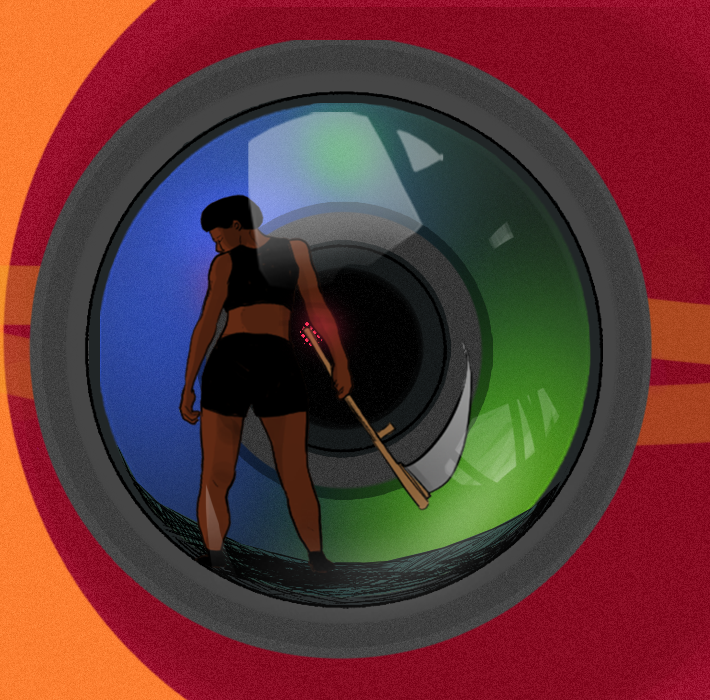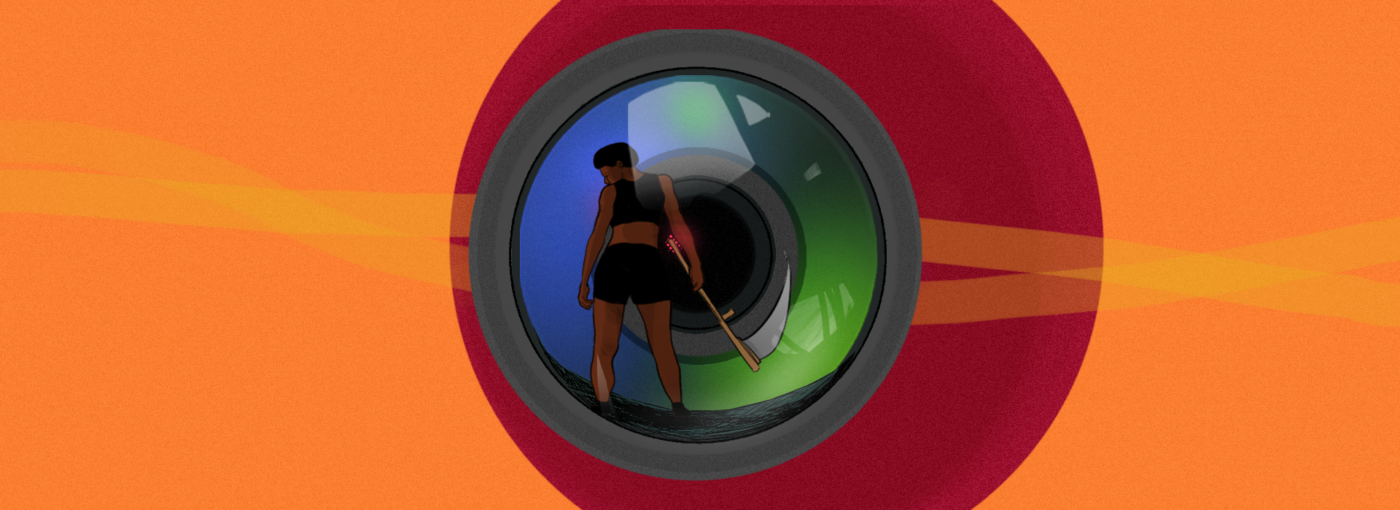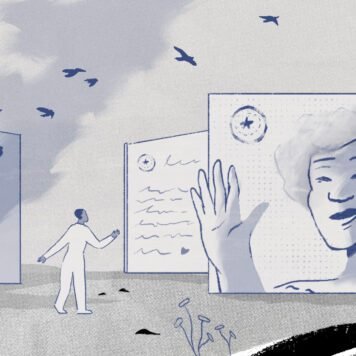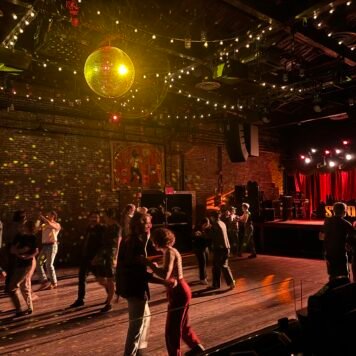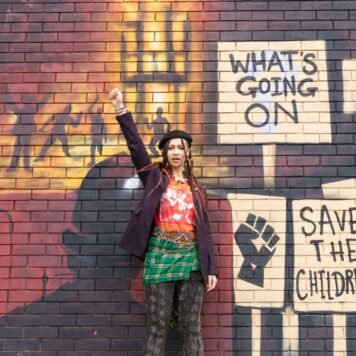We open in a roaring crowd, in a stadium packed to the rafters with a wash of humanity, and a single woman in the eye of the hurricane. She is Loretta Thurwar, and this is the heart-pounding start of Chain-Gang All-Stars, the debut novel by author Nana Kwame Adjei-Brenyah.
Set in a vision of America where a legal provision established a system of for-profit gladiatorial bloodsport built out of the carceral system, prisoners are offered the choice to commute their sentences in exchange for participating in Criminal Action Penal Entertainment (CAPE).
CAPE participants are subjected to constant, reality-TV surveillance and face each other in death matches for three years with the hope of walking away “High Freed.” The chances of surviving to the end are low – only one person in CAPE’s history has ever been Freed – but in a world where the choice is between a long death or a slow death, what can you lose by taking your chances?
“Dystopia just depends on what side of the street you’re on.”
Chain-Gang All-Stars is ostensibly a dystopia, but calling it a dystopia seems to miss the central point of the novel – that the heart of many of these experiences is the reality of many Americans.
The world of Loretta and her lover, Hamara “Hurricane Staxx” Stacker, is filled with a litany of violences committed by them and against them. We follow the pair as they struggle to preserve their humanity and dignity in a system whose profit motive is to literally bleed them dry. It is not a stretch to say that the hyper-carceral, hyper-capitalist world of Loretta and Hamara is just a few steps from our own.
“It’s really just a slight extrapolation against where we already are,” Nana observes as we chat over Zoom. “And that is the sort of idea, to remind us that we are already in a horrific place. People always ask me about dystopias and why I’m interested in dystopias. And I’m like, I think dystopia just depends on what side of the street you’re on. If dystopia means unnecessary suffering, it’s everywhere.”
Nana is a seasoned observer of this casual dystopia. His first book was a collection of short stories, Friday Black, which was released in 2018 to critical acclaim. In it, neighbours resort to violence to cope with a nuclear time-loop; Black and Muslim workers at an amusement park reenact fictional situations of racial or terrorist violence for a white American interactive audience; minimum-wage mall workers sweep dead bodies out of the Black Friday displays.
Friday Black’s sites of violence are our ordinary surroundings– schools, homes and shopping malls – so perhaps it makes sense that Nana has made his next literary foray into the ultimate site of normalised state violence: the carceral system, where the nuances of race, gender, sex and power are pushed into bleedingly-high contrast.
“I realised pretty quickly that prison had more than enough for me to sink my teeth into, so to speak, because the fundamental premise of prison is that a person’s humanity can be assigned or unassigned,” Nana says. “It’s essentially slavery; explicitly so, in America at least. And once that premise was true, what are all the different ways in which this evil, in my opinion, exists? What are all the different ways it’s squeezing and stomping on our ability to exist as humans?”
The (un)fictional alliance of state violence and capital
Throughout Chain-Gang All-Stars, we see how these immense forces of dehumanisation function to make death acceptable, and even encouraged, in the world of CAPE.
The devil is in the details of Nana’s work, testament to his background in short fiction. In between scenes of sprawling and vicious action, he will note that they sell space on the gladiator’s body armour to advertise brands like “WholeMarket” or “Horizon Wireless.” The most lucrative space for advertising? The gladiator’s crotch.
Roving eyes of the police and the public watch their every move through Holo Microphone Cameras, effectively eliminating privacy and producing constant streams of content for viewers at home. In the footnotes, references abound to fictional families operating the corporate boards for military-grade weaponry, who share surnames with pro-carceral congressmen and administrators of for-profit prisons.
From time to time, you are startled with real names and concepts: George HW Bush and the 1033 Program; the 19th century Auburn system; George Stinney, 14 years old, killed by the electric chair in South Carolina. These stories and the mechanics of death that are spun out into fiction on the page have very clear roots in our current reality; again, dystopia is not as far away as it seems.
Talking about the 2020 Black Lives Matter protests that seared across the United States, Nana mentions that he was going through his things while writing this book and found a pair of reflective snowboarding goggles. “I was like, I have never snowboarded, why do I have these? Then I was like, oh yeah, ‘cause I was afraid they were gonna shoot my eye out in the protests.” I laughed alongside him, but it’s the type of anecdote and image that makes you realise the extent to which this type of militarization and violence at the hands of the state has been rationalised. “You know, sometimes you think like, am I just being like a dickhead? Am I being extra?” Nana laughs. “But like we are really under the thumb of true oppression, and we kind of are chill about it because we have access to a lot of comfort.”
It feels true to me that I have been chill in the face of oppression. The full force of the state has never been brought to bear on me in the same way that it does on Black and brown communities nationwide, or on the incarcerated population – but finding myself conveniently on the side of the people that “deserve protection” does not negate the responsibility I have to strive for a better world for all, even though it is distressingly easy to lose sight of that duty. I protested with Black Lives Matter activists in 2020. I saw tear gas being rinsed out of my classmates’ eyes with milk. Now, I barely think twice seeing heavily armed police in subway stations, never mind that they are evidence of the federal government’s investment of 7.4 billion dollars in supplying police departments nation-wide with military-level equipment like grenade launchers and tanks. This vast arm of police militarisation was used in 2020 against BLM protesters, and it is currently being used against protesters in Atlanta, or to surveil political activists working for justice. If we stop squinting and look at what we live with, the security architecture and the exercise of violence we have unknowingly accepted to be normal is astounding.
If, like me, the blend of fiction, drama and crushing reality of Chain-Gang All-Stars makes you uncomfortable with how little you know and care about the system that frames our punitive society, that is the point Nana is trying to achieve. “I guess my argument or what I’m feeling is that these horrors are really happening and we mostly don’t care,” he says. “So how do we reconcile the fact that we live under a government that murders its citizens sometimes? And how and why are we okay with that?”
“The whole thing is the gallows”
The reality of surviving prison is unequivocally a life-or-death thing. Deaths in jails and prisons are almost certainly underreported. It was only in 2002 that the federal government passed the Death in Custody Reporting Act (DCRA) requiring states to report numbers of people who died in jail or prison, yet the DRCA is ineffectively practised.
To this day, neither we, nor the states, nor the federal government have any real information for how many people lose their lives in prison. Cruel and torturous conditions not only cause death behind bars, their effects also persist among the formerly incarcerated, who are 62% more likely to commit suicide compared to the general population.
The United States also retains the death penalty – last year, the state sentenced 20 people to death and executed 18 people. Of the 20 attempted executions in 2022, 35% were “visibly botched,” including a 3 hour-long procedure that is the longest lethal injection execution in US history. Beyond this, life in prison is also deeply and deliberately miserable – everything from food access, to healthcare, to space and privacy, is impacted by a terrible state neglect of basic human rights.
Learning about the horrors of the prison system is something that Nana has had to sit with over the seven year process of researching and writing this novel, which took him through work with organisations that tackled the issue of prison reform both inside and outside the institution. “The whole thing is the gallows and it’s all disgusting. No matter how much we dress it up or dress it down or try to hide it its heart is the same,” he says. “It’s like murder, murder, murder, murder. All types of murder. State sponsored murder that you paid for – and it’s super expensive, actually.” He adds, “We just have this unwillingness to realise the whole thing is inhumane. There’s not a pretty way to make it.”
Subscribe to shado's weekly newsletter
Exclusive event news, job and creative opportunities, first access to tickets and – just in case you missed them – our picks of the week, from inside shado and out.

While Chain-Gang All-Stars is certainly not pretty, it is compulsively readable. Although it is horrifying to witness the violence of the system, it is perversely easy to get lost in the entertainment of Nana’s killer prose. Like public execution at the gallows in the past, there is an audience that participates in this bloodlust, and you are not exempted as a reader.
Periodically, Nana sinks us into the perspectives of spectators, Will and Emily, who follow the show with varying levels of zeal and fan-boy dedication, comparing stats, explaining the nuances of the game’s “plotlines,” and comparing best “seasons” as if each kill on the highlight reel wasn’t a human life. It is in these moments where our own spectatorship is pronounced, and our complicity lingers past the end pages and into our daily lives.
“Non-refusal is complicity. Not saying anything is an allowance,” Nana says. “I wanted to explore what it means to partake in violence, even if that partaking is just quietly being in the stands, which I think many of us are. Like, we’re not cheering, but we’re just sort of watching it on TV, and that’s very different from protesting outside the stadium.”
Partaking and not partaking in systems of violence is something that still twists my gut today. Living in the modern day, it is hard to make any choice that isn’t tainted with the consequences of participating in vast global structures that hurt and kill the vulnerable. Protesting outside of the metaphorical stadium is something I do engage in, but that privilege of time and capability is something I don’t have on the regular and that some people don’t have at all. In a space where actions of resistance have to feel large to have a real impact, it is easy for people feeling like they bear this responsibility to feel completely burnt out as an individual in the face of the immovable.
In college, I had a professor who taught a Critical Theories class that would urge us to do something blatantly resistant once a day. It could be anything, from going to a protest or teach-in, to deciding not to buy Nestlé chocolate or driving around in an electric car with a peace sign sticker on the bumper. “It doesn’t matter what impact it might have in the face of such big global forces,” she would say. “What matters is that you do it, you think about it, and you stay aware of it. Thinking: how have I been resistant today? stops you from getting complacent.” It is not a perfect antidote against such large-scale issues, but it is a feasible way of reminding ourselves of what we are driven to partake in, and how we can exercise real, cumulative effort to withdraw our participation in the systems that bind us.
“The culture here is love”
If the world of Chain-Gang All-Stars is a prophetic vision of what we could be that terrifies us, it also impresses upon us the need to reject the current system and strive for something new and different.
Abolition and resistance are the clear revolutionary philosophical thrusts of Chain-Gang All-Stars, both abolition of the violent and dehumanising systems that we find ourselves complicit in, and an internal abolition through the liberation of the self.
Activists in the story move to dismantle the legislation and stadiums that make up this architecture of oppression, not without significant pushback from the status quo, and the CAPE participants resist in the ways in which they control, behave and make their choices.
Making space for care, and making space for love, was an important goal for Nana in writing Chain-Gang All-Stars; some of his most exquisite prose comes when he eulogises the deaths of incarcerated people, both fictional and real, as the human cost of this inhumane system.
We see touching moments of recognition and acknowledgement of life and love among the gladiators in CAPE. Hamara, as she is made to kill, asks the crowd to call out and embrace love in a call-and-response piece that is only a schtick if you don’t, or can’t, recognise the sincerity of her words. Radicality in Chain-Gang All-Stars is exhibited in practising our capacity to respect and recognise dignity and humanness in others, a form of impactful abolition that we can carry out to our reality.
“I think I wrote the book kind of hoping I was an abolitionist, you know, and I think in doing that I found out I was,” Nana says. “The frameworks we’ve been given are very reductive and dehumanising and they lead to violence. So for me, abolition is the belief that a person’s humanity is not negotiable, yours or others.” He adds: “Basically: we live in a world where pain, death, force and control are the rules. And I want the rule – the guiding rule, the guiding principle – to be compassion.”
To choose love and to choose compassion is to step beyond the false choices offered by a world that aims to bend us towards violence, and imagine something that could be better for everybody.
I was also unsure whether or not I was an abolitionist—I picked up Chain-Gang All-Stars in November of 2022, where the muddied wake of the pandemic and of a hot reexamination of race-relations in America made it unclear if the optimism of the passing moment could manifest into real change, or if we would end up slipping back into what was. Re-reading the novel now, with a deeper personal involvement in abolitionist studies and activism, I would say that that past indecision is perfectly fine. To feel iffy about change is human. What matters is finally being able to recognize that that change is necessary. Abolition was described throughout the 19th century interchangeably with the biblical “Jubilee” – a moment of joy and liberation that could manifest in new creation. We have to understand that the creative and healing power of abolition far outweighs the evident growing pains of the process. We owe it to ourselves and others to take that leap of faith, to hope that the world that we imagine and create is ever so slightly better than what we have currently.
“It takes imagination and heart and strength to be like, okay, the culture here is kill. But I’m saying the culture here is love,” Nana adds. “That takes imagination, and as a writer that’s the skill I know I have, and I’m trying to gift it to other people.”
What can you do?
See. Act. Do.
Nana’s research for Chain-Gang All-Stars has led him to work with a few organisations:
- The Rockland Coalition to End the New Jim Crow which is active in prison reform in Rockland County, NY and beyond
- PEN America does a wealth of work with currently incarcerated writers, including fellowships, mentorships and grants, as well as publishing work produced by the writers themselves
Other organisations:
- The Fortune Society is based in Long Island City, NY and works nationally to prevent recidivism and support reentry for people involved with the justice system
- The Innocence Project is based in Harlem, NY and works nationally to overturn wrongful convictions and advocate for more compassionate justice systems
- The Marshall Project provides non-profit journalism and reporting on criminal justice and incarceration
- The Center for Prison Reform has an even greater list of more geographically or issue- specific organisations that work towards reform and abolition
Recommended reading:
- Golden Gulag: Prisons, Surplus, Crisis, and Opposition in Globalizing California by Ruth Wilson Gilmore, author as well of Abolition Geography: Essays towards Liberation
- Are Prisons Obsolete? by Angela Davis
- War on Poverty to the War on Crime: the Making of Mass Incarceration in America by Elizabeth Hinton, author as well of America on Fire: The Untold History of Police Violence and Black Rebellion Since the 1960s
- We do this till we Free Us by Mariame Kaba
- Punishment for Sale: Private Prisons, Big Business, and the Incarceration Binge by Donna Selman and Paul Leighton
- Read more articles by Ning HERE
